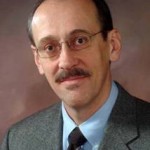Joint ViSE and ME Seminar: Fixing the Beating Heart: Ultrasound-Guided Robotic Surgery, SC 5326, Thursday September 19, 11:50. Refreshments provided.
Fixing the Beating Heart: Ultrasound-Guided Robotic Surgery
Speaker:
Robert D. Howe
Abbott and James Lawrence Professor of Engineering
Area Dean for Bioengineering
Harvard School of Engineering
Date: Wednesday September 19th
Time: 11:50 Social, 12:00 Seminar Start
Place: Stevenson Center, 5326
Abstract:
To treat defects within the heart, surgeons currently use stopped-heart techniques. These procedures are highly invasive and incur a significant risk of neurological impairment. We are developing methods for performing surgery within the heart while it is beating. New real-time 3D ultrasound imaging allows visualization through the opaque blood pool, but this imaging modality poses difficult image processing challenges, including poor resolution, acoustic artifacts, and data rates of 30 to 40 million voxels per second. To track instruments within the heart we have developed a Radon transform-based algorithm, which is readily implemented in real-time on graphics processor units. For manipulation of rapidly moving cardiac tissue we have created fast robotic catheters that can track the tissue based on ultrasound image features. This allows the surgeon to interact with the heart as if it was stationary. In vivo validation of this technology in atrial septal defect closure and mitral valve annuloplasty procedures demonstrate the potential for improved patient outcomes.
 Robert D. Howe is Abbott and James Lawrence Professor of Engineering and Area Dean for Bioengineering in the Harvard School of Engineering and Applied Sciences. Dr. Howe founded the Harvard BioRobotics Laboratory in 1990, which investigates the roles of sensing and mechanical design in motor control, in both humans and robots. His research interests focus on manipulation, the sense of touch, and human-machine interfaces. Biomedical applications of this work include the development of robotic and image-guided surgical procedures. Dr. Howe earned a bachelor’s degree in physics from Reed College, then worked as a design engineer in the electronics industry in Silicon Valley. He received a doctoral degree in mechanical engineering from Stanford University in 1990, and then joined the faculty at Harvard. Dr. Howe is a Fellow of the IEEE and the AIMBE. He is a recipient of the National Science Foundation Young Investigator Award and best paper awards at mechanical engineering, robotics, and surgery conferences. His lab web site is http://biorobotics.harvard.edu/
Robert D. Howe is Abbott and James Lawrence Professor of Engineering and Area Dean for Bioengineering in the Harvard School of Engineering and Applied Sciences. Dr. Howe founded the Harvard BioRobotics Laboratory in 1990, which investigates the roles of sensing and mechanical design in motor control, in both humans and robots. His research interests focus on manipulation, the sense of touch, and human-machine interfaces. Biomedical applications of this work include the development of robotic and image-guided surgical procedures. Dr. Howe earned a bachelor’s degree in physics from Reed College, then worked as a design engineer in the electronics industry in Silicon Valley. He received a doctoral degree in mechanical engineering from Stanford University in 1990, and then joined the faculty at Harvard. Dr. Howe is a Fellow of the IEEE and the AIMBE. He is a recipient of the National Science Foundation Young Investigator Award and best paper awards at mechanical engineering, robotics, and surgery conferences. His lab web site is http://biorobotics.harvard.edu/
